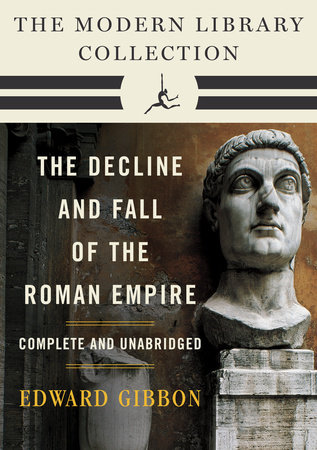"History is indeed little more than the register of the crimes, follies, and misfortunes of mankind."
Historian #EdwardGibbon died 225 years ago #onthisday 1794. Good moment to dip into our 1776 2nd edition of his classic 'The History of the Decline and Fall of the Roman Empire'.

Edward Gibbon’s THE DECLINE AND FALL OF THE ROMAN EMPIRE (1776)
Historian Edward Gibbon was born in Putney, Surrey, England on this day in 1737.
"Antoninus diffused order and tranquility over the greatest part of the earth. His reign is marked by the rare advantage of furnishing very few materials for history; which is, indeed, little more than the register of the crimes, follies, and misfortunes of mankind."
--from THE DECLINE AND FALL OF THE ROMAN EMPIRE (1776)
Edward Gibbon’s classic timeless work of ancient Roman history in 6 volumes collected into 2 boxed sets, in beautiful, enduring hardcover editions with elegant cloth sewn bindings, gold stamped covers, and silk ribbon markers. READ more here: https://www.penguinrandomhouse.com/…/the-decline-and-fall-…/

Decline and Fall of the Roman Empire: The Modern Library Collection (Complete and Unabridged)
PRAISE
“Gibbon is one of those few who hold as high a place in the history of literature as in the roll of great historians.”—Professor J. B. Bury
“Gibbon is a landmark and a signpost—a landmark of human achievement: and a signpost because the social convulsions of the Roman Empire as described by him sometimes prefigure and indicate convulsions which shake the whole world today.”—E. M. Forster
“I devoured Gibbon. I rode triumphantly through it from end to end and enjoyed it all.”—Winston Churchill
“Gibbon is a kind of bridge that connects the ancient with the modern ages.”—Thomas Carlyle
“Gibbon is not merely a master of the pageant and the story; he is also the critic and the historian of the mind. . . . We seem as we read him raised above the tumult and the chaos into a clear and rational air.”—Virginia Woolf
https://www.ccel.org/g/gibbon/decline/volume1/chap19.htm
Description of ParisHis salutary influence restored the cities of Gaul, which had been so long exposed to the evils of civil discord, barbarian war, and domestic tyranny; and the spirit of industry was revived with the hopes of enjoyment. Agriculture, manufactures, and commerce again flourished under the protection of the laws; and the curiaea, or civil corporations, were again filled with useful and respectable members: the youth were no longer apprehensive of marriage; and married persons were no longer apprehensive of posterity: the public and private festivals were celebrated with customary pomp; and the frequent and secure intercourse of the provinces displayed the image of national prosperity.(91)
《羅馬帝國衰亡史》第19章,愛德華·吉朋(Edward Gibbon)。中譯:戚國淦 ,北京商務,1994
第22章 尤利安的繼位,他的人品。第23章 尤利安的宗教信仰。他的狂熱。他對異教的復興和改革。...... 第24章 約維安的當選。尤利安之死和其反響
《羅馬帝國衰亡史》第2卷24章,愛德華·吉朋(Edward Gibbon)。中譯:席代岳,台灣聯經,2004
civil corporation
: a corporation organized for business purposes —contrasted with eleemosynary corporation
eleemosynary
ランダムハウス英和大辞典
音節
el • ee • mos • y • nar • y 発音
èlimɑ'sənèri,-mɑ'z-,èliə-|èliiːmɔ'sinəri,èliːmɔ'z-
[形容詞]
1義援金の,施し(物)の;慈善的な;慈善による[からの].
2慈善(金)に頼る,施しを受けている
an eleemosynary educational institution
慈善教育施設. 語源
1620年以前.<中世ラテン語 eleēmosyn
 rius(後期ラテン語 eleēmosyna「施し」より;→ALMS)
rius(後期ラテン語 eleēmosyna「施し」より;→ALMS)

沒有留言:
張貼留言